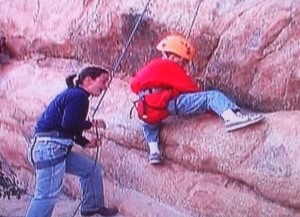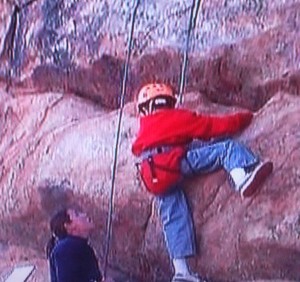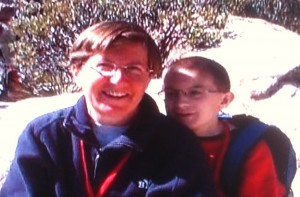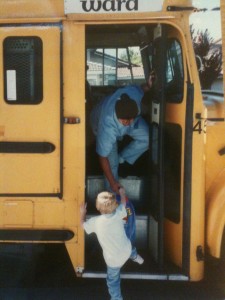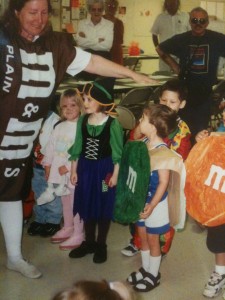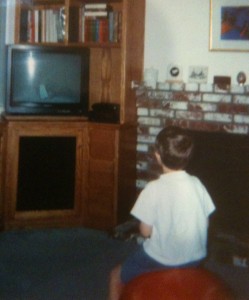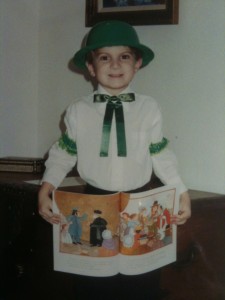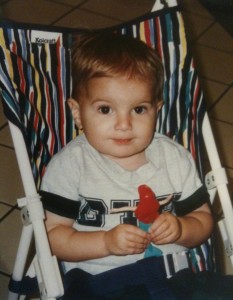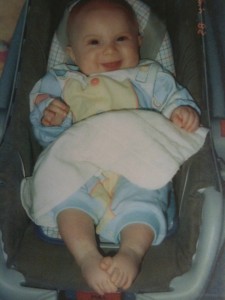Present word count of WIP: 51,899
Yes, I put the blog post ahead of my writing today. In fact, this may have to count as my writing today.
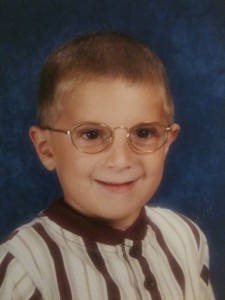
Jason in First Grade with his new glasses
I thought First Grade would be much like Kindergarten for Jason, despite his new glasses.
It wasn’t.
Even though he had a kind and attentive teacher and was classmates with many of the same kids he’d come to know in Kindergarten…and even though he was doing well academically, he was suddenly unhappy about going to school. He didn’t like doing homework (especially math), and he hated recess. First real warning sign.
He didn’t want to talk about his aversion to recess, so it was particularly hard, given his Aspergers, to get the details out of him. I even went on a few reconnaissance missions of my own to gain clues. (I felt kind of silly spying on my own child, but a Mom’s got to do what a Mom’s got to do.) Eventually, I got the full picture:
Almost every day, one kid or another (usually a second or third-grader…that’s the problem with graduating to first grade: you’re no longer in a playground all your own) was hassling him. Generally, it was something seemingly innocuous like chasing him or trying to scare him–normal behavior for kids that age, perhaps, but then Jason didn’t perceive things normally. He certainly didn’t like it. I found out that he’d been pushed down and held down a couple of times. Without a friend to stick up for him, school had suddenly become very lonely and even dangerous.
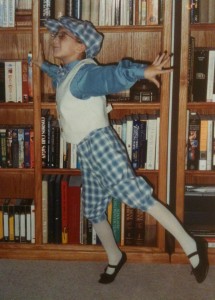
Jason in one of his costumes for "Alice in Wonderland"
The only fun outlet for him now was the Riverside Children’s Theater. We had signed both him and his sister up during his Kindergarten year and he thrived, both in their Saturday classes and in rehearsals and performances. (Why is it that actors are always so tolerant of unique qualities and characteristics?) In fact, he won the Best Actor award for his age group and even got a speaking part (one line) in their production of “Cinderella.” The director thought he was so cute that he made up a line for him. For the following production, “Alice in Wonderland,” he got two roles. But the boys in RCT were nothing like the boys at school.
At school, he wanted to have friends, but all the boys he’d known in Kindergarten had moved on to sports like basketball, soccer, and baseball. Jason playing sports? Believe me, I tried. I signed him up for T-ball. He hated it. We got him a miniature Fisher-Price indoor basketball hoop. For the first week or so, he threw the ball into it, but gradually he started throwing one of his Power Puff dolls into the hoop instead. Then he simply left the hoop alone and played with the dolls.
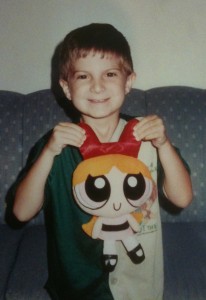
Jason showing off Blossom, one of the Power Puff Girls
He was obsessed with the Power Puff Girls. That drew a couple of girls to him as friends, but the boys mostly thought he was “different.” They either teased him, or avoided him altogether.
Each day I’d send him off to school, hoping at least one boy would reach out to him and be kind. Each day, he’d return despondent. I was aching to help him, but felt powerless.
First of all, I didn’t know, myself, what I was dealing with. There was such a stigma a decade ago about boys playing with dolls and I’m afraid I gave into it. I tried to draw him away from his sister’s toys and instead interest him in anything more “masculine.” He just wasn’t interested in cars, trucks, soldiers, toy guns, etc.
Finally, I went on the Internet, typed “boys who play with dolls” in the search engine, and began to read. I must have spent a day and a half on my computer looking for any kind of clue to the puzzle that my son now appeared to be. First, I thought I’d found my answer when I landed on a page detailing some kind of disorder, having to do with the senses. (I believe they’ve either discounted that disorder now or folded it into another because I can no longer find it.) The description fit Jason, but not quite. Fortunately, the page included links to related disorders and one of those was Asperger’s.
I still remember how I felt when I clicked on the Asperger’s page and began to read about my son. As I read about the obsessions, the difficulties with sensory overload, the problems with communication and motor skills, and, most of all, the challenges in socializing, I kept thinking, “This is it! This is my son!”
I printed off the page and showed it to my husband that night after dinner. He wasn’t nearly as convinced as I was (but, then, it’s not uncommon for at least one of the parents to fight the admission that there might actually be a scientific reason behind their child’s “different” behavior). Still, I called Jason’s teacher the next day and asked if I could meet with her after school. She agreed.
Once all the other kids had left the room the following afternoon, Ms. Rios and I got Jason involved in some games in the corner of her room and we sat down to talk. I was determined, first of all, to get her read on my son outside of any context involving Asperger’s syndrome or autism. So, I hadn’t given her any heads up other than to say I had some concerns about Jason.
I began by asking how he was getting along with the other kids in the class. She said that he didn’t seem to be having any problems, but that he did tend to stay to himself. I asked if she ever observed him playing games with any of the other children. She paused to think and then admitted that he preferred playing alongside them rather than getting involved in their games. I think I also asked about any peculiarities she might or might not have observed about my son. She noted a couple (relating to his sense of unease outside and being bothered by certain noises). Then I decided it was time to show her the printout. I handed it to her, saying, “Would you mind reading this and telling me what you think?”
I waited while she read, watching her eyebrows rise and her head nod more than a few times. When she finished, she looked up and said, “Wow. I’ve never heard of this before, but I think it sounds exactly like Jason. I think we should set up an appointment with the District’s School Psychologist.”
In that moment, I was both relieved and anxious. Relieved that at least one other person saw Jason the way I did, but anxious about the upcoming appointment and what it might confirm.
I won’t beat around the bush. We met with the psychologist. Fortunately, she was familiar with Asperger’s and she said that, in her opinion, Jason definitely exhibited signs of AS. She also was on our side, meaning that, since the district really only recognized autism and wasn’t yet aware of AS, she would be willing to mark him down as autistic so that Jason could get the services he needed.
Even with her diagnosis, I wasn’t through. Perhaps more to convince my husband than myself, I sought a second opinion from an experienced neuropsychologist, one who had worked with an autism center in San Diego. She confirmed the diagnosis.
I threw myself headlong into researching anything and everything printed or published online about Asperger’s syndrome. Even with a diagnosis from two different professionals, my husband still wasn’t persuaded. He’d say things like, “Everybody has quirks in their personality.” Nevertheless, I stayed up many a late night, reading blogs like this in which mothers or fathers shared their journey to seek the answers to the puzzles their children presented. (I have a full shelf of books today, not to mention videos, most of which I collected in that first year after the diagnosis.)
Later that week, when we took Allison to sign up for Girls Softball, we passed by the playing fields where Little League was starting up. I looked out at those boys running around, tossing the ball to each other, and taking their turns at bat. Then I looked down at my son, whose hand I was holding tightly so that he wouldn’t take off in a panic from the occasional bee flying by.
I won’t lie. Tears came to my eyes in that moment, for I knew then that at least some of the dreams I’d had for my son would never materialize. A curve ball had struck out the son I’d thought I had. It was time to begin learning about the son I really had and building some new dreams.
On Friday, we’ll all be down in Utah celebrating Allison’s graduation from BYU, so I thought it would be a good time to post sometime that day about how all of these developments were affecting Jason’s sister. Siblings of those on the autistic spectrum have challenges of their own, and I’m so proud of the way Allison dealt with his Asperger’s.
Originally posted 2012-04-17 13:28:52.




